
27 Jan Government faces court challenge over access to justice
Ministers face a legal challenge this week on the costs victims of discrimination face when pursuing claims under the Equality Act, from disabled campaigner Esther Leighton
When organisations like shops or restaurants breach the Equality Act and discriminate against someone, it is up to individuals to take legal cases to address the discrimination they and wider society face.
Esther, a powerchair user, was first motivated to take legal action after traditional campaigning failed to address the single steps into shops which bar her and other disabled people from participating in everyday life, despite the solution often being an inexpensive removable ramp.
Esther’s cases have resulted in many businesses – from local shops to national chains – starting to comply with the Equality Act, becoming accessible to wheelchair users for the first time.
Esther said: “These cases are important because they are about my daily experience. Getting into a cafe or a shop may not sound significant to a lot of people, but it is this daily discrimination that excludes me and many disabled people from society.”
In the majority of her cases, Esther has represented herself as the cost of instructing a lawyer was prohibitive. However, when facing discrimination at the hands of large corporations, which are too complex or distressing for her to handle without representation, she faced serious financial risk. If a case is unsuccessful, paying the other side’s costs can run into thousands of pounds.
Esther said: “I can’t pay after filling my car up at many garages because of the single steps they have into their shops, but because of the petrol company’s complex franchise model, it’s impossible for me to challenge it without risking being landed with a large bill. This loophole means discriminatory service providers don’t change their practices as they know they won’t be challenged, resulting in thousands of disabled people being unable to access basic services on a daily basis.”
This week’s Judicial Review legal challenge will seek to extend a system called “Qualified One Way Cost Shifting” (QOCS), which works very effectively for personal injury claims, to cover Equality Act cases too. The introduction of QOCS for Equality Act cases would allow disabled people, and others, to challenge discrimination more easily because it would reduce the financial risk and increase access to legal representation.
Esther said: “I’d be delighted if this case improves disabled people’s access to justice. Ultimately, I wish the Equality Act was adequately enforced so I didn’t have to take cases, as the costs of doing so vastly exceeds any compensation awarded, but until then I will continue to challenge discrimination to achieve the shifts in society we so sorely need.”
The legal challenge will be heard on Tuesday 28 January at the Royal Courts of Justice on the Strand.
Esther Leighton’s solicitor is Louise Whitfield of Deighton Pierce Glynn and her barrister is Karon Monaghan QC of Matrix Chambers. The EHRC are funding the judicial review due to its strategic importance in ensuring access to justice for all people.
Further updates will be available on DPG’s website in due course.
